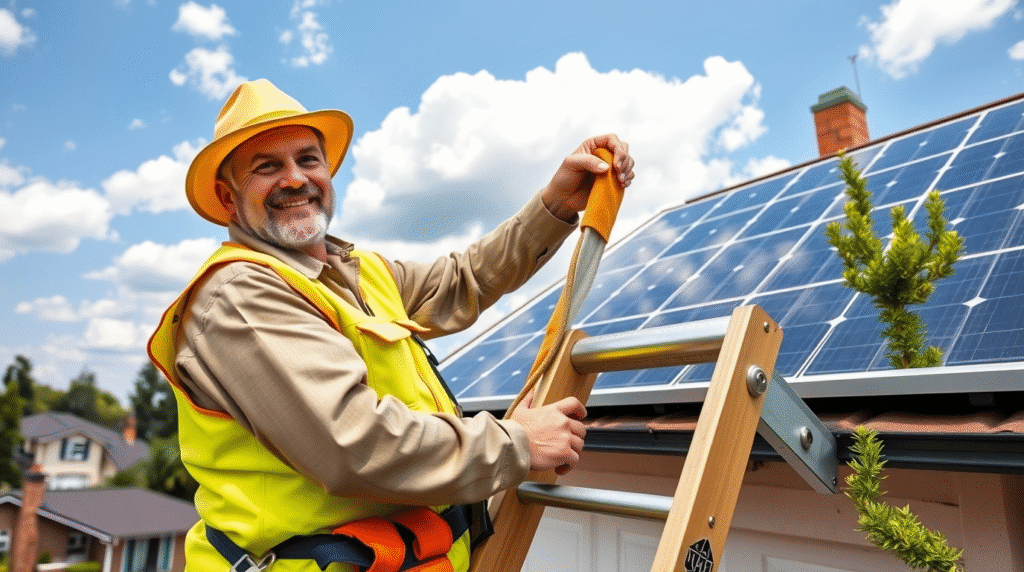Switching to solar energy is no longer a distant dream—it’s a smart move toward sustainability and savings. A Solar Installer plays a vital role in helping homes and businesses harness the power of the sun. With rising energy costs and growing environmental awareness, more people are turning to solar solutions. This detailed guide explains everything about solar installers, how they work, their benefits, and how to choose the best one for your needs.
What Does a Solar Installer Do?
A solar installer designs, assembles, and maintains solar energy systems. Their main job is to ensure that solar panels are correctly placed for maximum sunlight exposure. From site inspections to final connections, they handle every detail with precision. In most cases, they also educate clients on how to monitor and maintain their systems for long-term performance.
Installing solar panels requires both skill and planning. Every project begins with an assessment of roof space, shading, and energy requirements. Once the plan is approved, the installer secures the necessary permits and schedules installation. After completion, they test the system and ensure it operates safely and efficiently.

Why Hire a Professional Solar Installer?
Hiring a certified solar installer ensures proper installation and reliable performance. A professional installer follows strict safety standards, protecting your home and electrical system. Unlike DIY attempts, professional installation reduces risks of poor alignment or faulty wiring.
Additionally, professionals provide warranties and post-installation support. They also help you qualify for tax incentives and rebates available for solar energy users. With expert guidance, you can enjoy consistent energy savings and peace of mind knowing your investment is protected.
How Solar Installers Help You Save Money
Working with a skilled solar installer leads to long-term financial benefits. Solar systems generate free electricity from sunlight, reducing your dependence on utility companies. Over time, you’ll notice lower monthly bills and a significant return on your investment.
Moreover, solar panels increase property value. Homes with installed solar systems attract environmentally conscious buyers willing to pay more. Since maintenance costs are low, the overall financial benefits continue for decades.
Steps in the Solar Installation Process
The solar installation process involves several key stages: evaluation, design, installation, and inspection. Each phase plays a critical role in ensuring the system’s success.
- Site Assessment: The installer checks roof strength, direction, and shading.
- System Design: Based on energy needs, they design an efficient solar layout.
- Installation: Technicians mount panels, connect wiring, and set up inverters.
- Testing and Activation: The installer tests the system and connects it to the grid.
Throughout the process, communication remains clear and transparent. This ensures every step meets local regulations and performance goals.
Essential Qualities of a Good Solar Installer
A trustworthy solar installer combines technical expertise with professionalism. Look for companies with licensed technicians and strong customer reviews. Experience matters because solar systems require precise installation and calibration.
Good installers provide detailed quotes, explain technology clearly, and answer all questions honestly. They also use certified equipment from reputable manufacturers. Transparent pricing and reliable timelines reflect their commitment to quality service.
Benefits of Hiring a Local Solar Installer
Choosing a local solar installer brings several advantages. Local experts understand regional weather patterns, building codes, and incentive programs. They can design systems that perform better in your specific location.
Additionally, local installers offer quicker response times for maintenance or repairs. Building long-term relationships with local providers ensures reliable service whenever you need it. Supporting local businesses also strengthens your community’s economy.

Solar Installer Certifications and Standards
Reputable solar installers hold certifications from recognized organizations. The most respected credential is the NABCEP (North American Board of Certified Energy Practitioners). This certification proves that the installer meets high technical and ethical standards.
Certified installers stay updated with the latest solar technology and safety codes. Their training ensures your system is installed efficiently, reducing potential issues in the future. When choosing a provider, always verify their certification status and experience level.
Common Challenges in Solar Installation
Solar installation can face challenges such as roof limitations, permit delays, or unexpected costs. Skilled installers address these issues through detailed planning and communication.
Before installation, professionals conduct feasibility studies to identify potential problems. They also manage paperwork for grid connection and local approvals. With proper coordination, these challenges are resolved smoothly without affecting the project timeline.
Maintaining Your Solar System After Installation
Once the system is installed, maintenance is minimal but essential. Regular cleaning keeps panels free from dust and debris, improving energy efficiency. A reliable solar installer offers maintenance services to monitor performance and fix any technical issues.
Most systems include smart monitoring tools that show daily energy production. If performance drops, installers quickly diagnose the problem and restore full functionality. Proper care ensures your panels last for over 25 years with minimal degradation.
Environmental Impact of Professional Solar Installation
Installing solar panels significantly reduces your carbon footprint. Each system lowers greenhouse gas emissions by replacing fossil-fuel-based electricity with clean solar power.
Professional solar installers optimize system design for maximum efficiency, meaning more energy is generated per panel. Over time, this contributes to a cleaner planet and helps combat climate change. Choosing solar energy supports both economic and environmental sustainability.
How to Choose the Right Solar Installer for Your Home
Selecting the right solar installer requires careful research. Start by checking company credentials, customer feedback, and previous project photos. Request multiple quotes to compare costs, equipment brands, and warranties.
A good installer should listen to your goals and recommend the best system size and technology for your property. They should also offer transparent pricing, clear contracts, and long-term support. Choosing wisely ensures excellent performance and long-term satisfaction.

Conclusion:
Switching to solar energy is an investment in a cleaner, brighter future. A professional solar installer turns that dream into reality by providing safe, efficient, and lasting solar solutions. By hiring a trusted expert, you ensure maximum energy savings and minimal stress.
Ready to reduce your bills and help the planet? Contact a certified solar installer today and take the first step toward energy independence.
FAQs
1. What does a solar installer do?
A solar installer designs, installs, and maintains solar energy systems for homes and businesses, ensuring efficient energy production and safety.
2. How long does solar installation take?
The process usually takes one to three days, depending on system size and site conditions.
3. Do solar installers provide warranties?
Yes, professional solar installers offer warranties on both equipment and workmanship, protecting your investment.
4. Can I install solar panels myself?
DIY installation is not recommended. Professional installers ensure safety, compliance, and long-term efficiency.
5. How long do solar panels last after installation?
High-quality solar panels last 25 to 30 years, with regular maintenance ensuring consistent performance.

